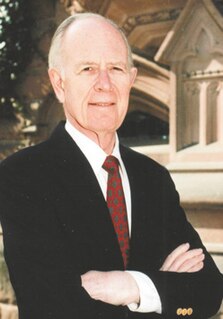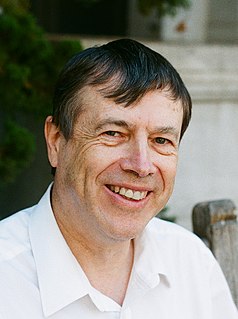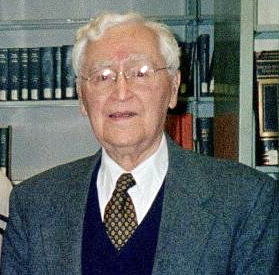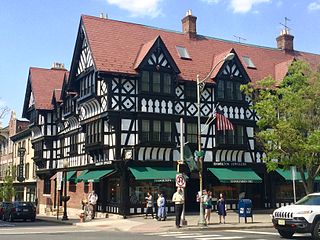
Henry Jones Ford was a political scientist, journalist, university professor, and government official. He served as president of the American Political Science Association. He was appointed by Woodrow Wilson as the Banking and Insurance Commissioner of New Jersey in 1912.

Robert Fagles was an American professor, poet, and academic, best known for his many translations of ancient Greek and Roman classics, especially his acclaimed translations of the epic poems of Homer. He taught English and comparative literature for many years at Princeton University.

Kunihiko Kodaira was a Japanese mathematician known for distinguished work in algebraic geometry and the theory of complex manifolds, and as the founder of the Japanese school of algebraic geometers. He was awarded a Fields Medal in 1954, being the first Japanese national to receive this honour.

Michael Hartley Freedman is an American mathematician, at Microsoft Station Q, a research group at the University of California, Santa Barbara. In 1986, he was awarded a Fields Medal for his work on the 4-dimensional Generalized Poincaré conjecture. Freedman and Robion Kirby showed that an exotic R4 manifold exists.

Robertus Henricus "Robbert" Dijkgraaf FRSE is a Dutch mathematical physicist and string theorist. He is the director and Leon Levy professor at the Institute for Advanced Study in Princeton, New Jersey, and a tenured professor at the University of Amsterdam.

Jean, Baron Bourgain was a Belgian mathematician. He was a faculty member at the University of Illinois, Urbana-Champaign and, from 1985 until 1995, professor at Institut des Hautes Études Scientifiques at Bures-sur-Yvette in France, and since 1994 at the Institute for Advanced Study in Princeton, New Jersey until 2018. He was an editor for the Annals of Mathematics. From 2012–2014, he was appointed a visiting scholar at UC Berkeley.

Yoichiro Nambu was a Japanese-American physicist and professor at the University of Chicago. Known for his contributions to the field of theoretical physics, he was awarded half of the Nobel Prize in Physics in 2008 for the discovery in 1960 of the mechanism of spontaneous broken symmetry in subatomic physics, related at first to the strong interaction's chiral symmetry and later to the electroweak interaction and Higgs mechanism. The other half was split equally between Makoto Kobayashi and Toshihide Maskawa "for the discovery of the origin of the broken symmetry which predicts the existence of at least three families of quarks in nature."

Bruce Manning Metzger (1914–2007) was an American biblical scholar, Bible translator and textual critic who was a longtime professor at Princeton Theological Seminary and Bible editor who served on the board of the American Bible Society and United Bible Societies. He was a scholar of Greek, New Testament, and New Testament textual criticism, and wrote prolifically on these subjects. Metzger was one of the most influential New Testament scholars of the 20th century.

Carl Campbell Brigham was a professor of psychology at Princeton University's Department of Psychology and pioneer in the field of psychometrics. He sat on the Advisory Council of the American Eugenics Society and his early writings heavily influenced the eugenics movement and anti-immigration legislation in the United States, but he later disowned these views toward the end of his life. He created the SAT for College Board.

Robert Francis Goheen was an American academic, president of Princeton University and United States Ambassador to India.

Charles Ewing was an American politician from New Jersey, who served as Chief Justice of the New Jersey Supreme Court.

William A. Libbey III was an American professor of physical geography at Princeton University. He was twice a member of the U.S. Olympic Rifle Team, and rose to the rank of colonel in the New Jersey National Guard. He is also known for his first ascent of Mount Princeton in 1877.
Edmund Wilson Sr. was an American lawyer who served as the Attorney General of New Jersey from 1908 until 1914. He was the father of literary critic Edmund Wilson.

Winthrop More Daniels was an American government official and university professor. A friend and onetime assistant of then-Professor Woodrow Wilson, President Wilson appointed Daniels, then a member of the New Jersey Board of Public Utilities to the Interstate Commerce Commission in 1914, and stood by him through a bitter confirmation battle in the Senate. He was a longime professor at Princeton University, where he was an assistant to Wilson before becoming a fellow professor, and at Yale University.
Samuel Kirkbride Robbins was a Republican Party politician who served as Speaker of the New Jersey General Assembly and President of the New Jersey Senate.
Sido Louis Ridolfi was an American Democratic Party politician who served in the New Jersey Senate from 1954 to 1972, serving as Senate President in 1967.
Samuel Hugh Moffett (Korean: 마삼락 또는 마포삼락, Chinese: 莫菲特) was Professor Emeritus at the Princeton Theological Seminary. He was well regarded as a leading scholar on Christianity in the Far East, and was the author of numerous publications, including multiple volumes of A History of Christianity in Asia.

George Thomas Reynolds was an American physicist best known for his accomplishments in particle physics, biophysics and environmental science.
Stephen Joseph Herben Jr. was an American professor of philology at Bryn Mawr College. He specialized in English and German philology, and among other places did work at the American-Scandinavian Foundation in Copenhagen and Oxford University, as well as at Rutgers, Princeton, and Stanford University. His work included assistance with the etymological work of the second edition of Webster's New International Dictionary, and two articles on medieval literary descriptions of weapons and armor. The second of these articles, Arms and Armour in Chaucer, is still considered a standard on the subject.















